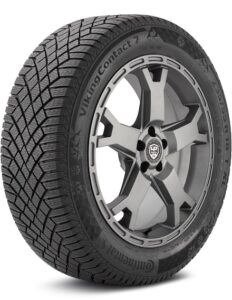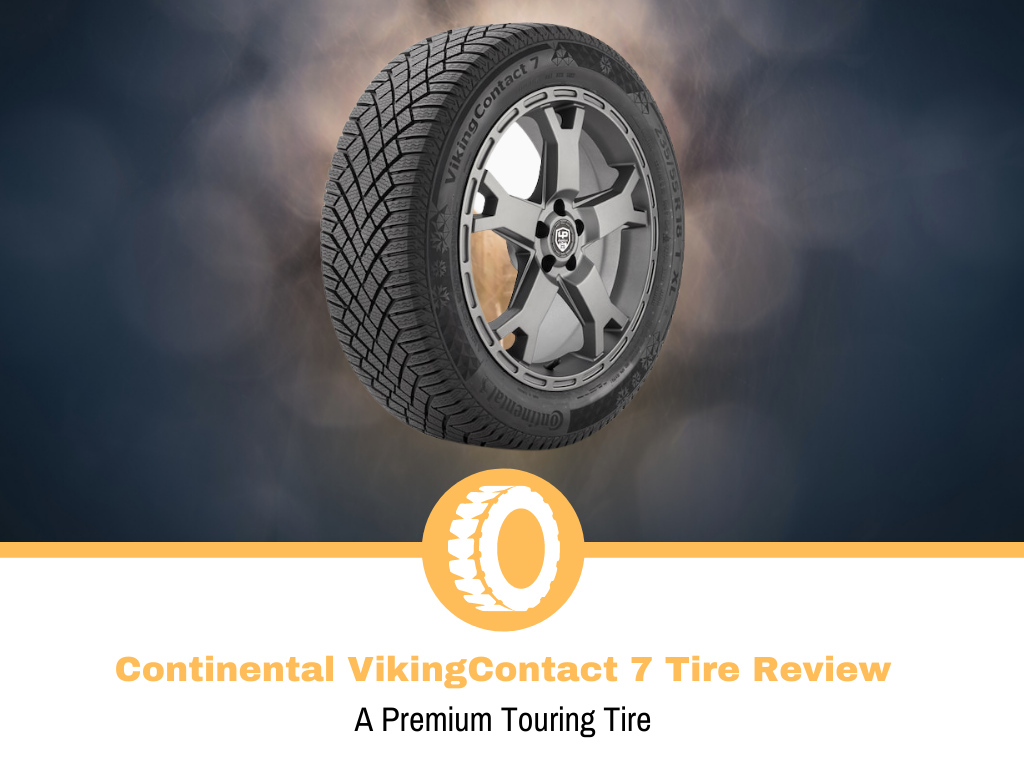
Price Check
Check the price of this tire at the following retailers:
Amazon TireRack DiscountTire Goodyear PriorityTire SimpleTireDon't know the correct size tire to purchase? Start here!
Pros
- One of the best snow performing tires
- Responsive with plenty of feedback through the steering wheel
- Superb grip and traction on dry and wet roads
- Excellent aquaplaning resistance
Cons
- Slightly longer wet braking distances
- Comfort and noise take a hit in specific scenarios
Several aspects influence our decision whenever we need to buy a new set of tires. Among those aspects are the conditions in which we drive. It is recommended to have tires explicitly designed for a particular scenario to ensure safe driving and get the most out of the tire. Take winter driving, for example.
Winter tires are made specifically so that they can cope with freezing temperatures, snow, or ice. Driving in the winter with summer tires is not a good idea because they will have almost no grip and traction. All-season tires do offer some performance, but not as much as proper winter tires.
There are plenty of brands that offer winter tires, meaning that you have plenty to choose from. In the premium segment, you have brands like Continental that have a history of making great winter tires. The model I’ll be talking about today is the VikingContact 7.
Like its predecessor, the VikingContact 7 is a studless winter tire capable of tackling the most extreme conditions. Continental promises some incremental improvements in multiple areas. Several percent improvements in aquaplaning resistance, braking distances, handling, and rolling resistance.
Since I’m not the type of person to believe the marketing material brands send out, let’s look at the features and then dive into the review.
What are the features of the Continental VikingContact 7?
Continental advertises the VikingContact 7 as a premium touring tire designed to tackle Scandinavian winter. To ensure that, the company utilized a rubber compound capable of performing in colder temperatures. It’s an active grip silica compound enriched with canola oil, and it brings several advantages to the table. On the one hand, the canola oil enables the tire to remain soft and flexible in the winter, while the silica improves performance in wet conditions.

The tread pattern of the VikingContact 7 is specially designed to aid in snow performance and improve aquaplaning resistance. Continental designed the pattern so that it can improve traction on wet roads and slush. The tire features sipes with different widths that are capable of keeping snow within them. As a result, snow traction should be improved.
Another area of the tire that helps with snow is the Grip Edges. They are placed at the shoulder blocks of the tire and are designed to improve snow and ice traction.
In terms of the aquaplaning resistance, the grooves and sipes throughout the tire should offer excellent water evacuation properties.
To improve stability, Continental designed the VikingContact 7 with links between the blocks. The result of this should be slightly stiffer blocks and better stability at higher speeds.
How does it behave on dry tarmac?
The VikingContact 7 is an excellent performer, considering that it’s a winter tire. You could say that I was even surprised by how well it handled.
Winter tires aren’t known for being the most responsive ones, but that’s not the case with the VikingContact 7. It provides a great reaction to steering inputs, and on top of that, it’s not as muted as some of the other winter tires on the market.
Continental’s idea of interlinking the blocks means that the tread is more stable, noticeable when driving at higher speeds.
Traction and grip also will not be an issue, as the VikingContact 7 has plenty of. You will hardly find yourself in a situation where the tire slips, which will be in some more extreme cases. This means that you can push the tire into a corner and not have problems.
You will also be getting a very safe tire, considering that the braking distances are among the shortest in its class.
How does it behave over wet and slippery roads?
The VikingContact 7 is a champ when it comes to wet performance, which is no surprise. Continental tires are known for being excellent wet performers.
Even though those are not ideal conditions, the tire is capable of providing plenty of traction. Hard acceleration won’t result in a slip like with some of the other tires. The lateral grip is also excellent, meaning that the tire can hold the car in place when cornering hard.
On the responsiveness side of things, you will lose a tad performance compared to the dry one, but it’s still impressive.
The weakest point of the VikingContact 7 is the braking distance. Even though they are still relatively short and the tire is safe, they are not as good as something you’d get with the Bridgestone Blizzak WS90.
How is it over snow?
Winter tires are designed to perform well on snow, but the VikingContact 7 excels in that.
Regardless if you’re driving in light or harsh conditions, the tire has one of the best winter performances in the market. Traction in shallow or deep snow will not be an issue, and the chances of getting stuck are slim.
The handling is also impressive, and the tire feels stable and always in control. Another remarkable aspect of the tire is the braking distances, which are among the shortest in this category.
Driving on ice with the VikingContact 7 doesn’t feel as sketchy as with some other tires. Traction and handling are excellent, and you are looking at very short braking distances.
Is it comfortable and refined?
The VikingContact 7 isn’t perfect, and that can be seen in the comfort and refinement section.
Comfort levels are very good, as long as the roads are smooth. With that said, most tires don’t struggle in these conditions, so it’s not something revolutionary. When you drive on rougher surfaces, the tire changes its character and becomes slightly harsh.
In terms of noise, things aren’t improving much, and it’s a similar story. The noise coming from the tire is surprisingly low, and that changes on rougher roads. You’ll have more tire noise, and the vibrations in the cabin will be more noticeable.
Is it good for off-roading?
For off-roading, the VikingContact 7 can be a good performer in theory. The snow performance can be easily translated into mud performance, meaning that it should be good for off-roading.
In reality, things are a bit different. Even though the performance for mud or gravel is there, the rubber compound cannot handle those conditions. Being a softer compound means that it doesn’t take much to get damaged.
Is the Continental VikingContact 7 ideal for sporty driving?
As a touring winter tire, I have to say that the VikingContact 7 has some sporty characteristics. I wouldn’t compare it with a performance tire, but it’s not as bad as some of its competitors.
On the handling side of things, the VikingContact 7 has a lot to offer. Responsive handling combined with decent feedback through the steering wheel is exactly what you need if you want to have fun.
Grip and traction are also areas where the VikingContact 7 isn’t lacking. There is plenty of both for aggressive acceleration or hard cornering.
At the end of the day, it’s not a performance tire, so don’t expect to get great times on a track.
Continental VikingContact 7 Warranty
In terms of warranty, Continental, unfortunately, went with the winter tire trend. The VikingContact 7 comes with no treadwear warranty. At the moment, the only manufacturer that offers a warranty is Michelin.
Continental VikingContact 7 Pricing: Is it worth the money?
Continental is known for offering premium tires at a price slightly lower than some of its competition, and the same goes for the VikingContact 7. The tire’s price starts from around $90, which is an excellent price for what the tire is offering.
The Bridgestone Blizzak WS90 with a similar size is a tad more expensive, while the Michelin X-Ice Snow is more expensive than that.
Should I buy the Continental VikingContact 7?
Yes, as long as you are prepared to make a few small compromises. The VikingContact 7 is an excellent tire, but it has some drawbacks.
Performance for the tire is not an issue. As long as it’s winter, the tire will perform marvelously regardless if it’s dry, wet, or snow. There are some areas where the tire shines, and there are somewhere it’s not the best. Despite that, it’s doubtful that you’ll feel like it doesn’t perform well enough.
You can even have some fun with it if you are that type of driver. The grip combined with the sporty-ish driving characteristics can make it a pleasant tire for a twisty road.
The area where it underperforms is the comfort and noise levels. As long as the road is smooth, the VikingContact 7 will be super comfortable and quiet. Once you start driving on a rougher surface, the tire starts to get harsh and noisy.
Then there’s the warranty or the lack thereof. Like most tires in the winter segment, the VikingContact 7 doesn’t have any treadwear warranty.
In general, if you’re prepared to sacrifice comfort in certain scenarios and get a tire with no treadwear warranty, the VikingContact 7 is one of the best options.
What Vehicles Will the Continental VikingContact 7 Fit?
Here’s a sample list of cars that the Continental VikingContact 7 will fit:
- Acura ILX, TLX
- Audi A3, A4, A6, Q2, Q3
- BMW 1, 3, 5 Series, X1, X2
- Ford Mondeo, Fiesta, Focus, Puma
- Hyundai i10, i10, i30, Elantra, Bayon, Kona
- Kia Optima, Stinger, Soul, Seltos
- Lexus IS, GS, LS, ES, NX
- Mazda 2, 3, 6, CX-3, CX-30
- Nissan Altima, Sentra, Juke
- Subaru Impreza, Legacy, Crosstrek
- Toyota Corolla, Celica, Prius, Avensis, Auris, Camry
- Volkswagen Beetle, Eos, Jetta, Golf, Tuareg, Tiguan
Tire Sizes for Continental VikingContact 7
15″
- 145/65R15
- 175/55R15
- 175/65R15
- 185/55R15
- 185/65R15
- 195/55R15
- 195/60R15
- 195/65R15
- 205/65R15
16″
- 195/50R16
- 195/55R16
- 195/60R16
- 205/55R16
- 205/60R16
- 205/65R16
- 215/55R16
- 215/60R16
- 215/65R16
- 215/70R16
- 225/55R16
- 225/60R16
- 225/65R16
- 225/70R16
- 235/70R16
- 245/70R16
17″
- 205/45R17
- 205/50R17
- 205/55R17
- 215/45R17
- 215/50R17
- 215/55R17
- 215/60R17
- 215/65R17
- 225/45R17
- 225/50R17
- 225/55R17
- 225/60R17
- 225/65R17
- 235/45R17
- 235/50R17
- 235/55R17
- 235/60R17
- 235/65R17
- 235/70R17
- 245/45R17
- 245/65R17
- 245/70R17
- 265/70R17
18″
- 215/50R18
- 225/40R18
- 225/45R18
- 225/50R18
- 225/55R18
- 225/60R18
- 235/40R18
- 235/45R18
- 235/50R18
- 235/55R18
- 235/65R18
- 245/40R18
- 245/45R18
- 245/60R18
- 255/45R18
- 255/60R18
- 275/65R18
19″
- 225/45R19
- 235/35R19
- 235/40R19
- 235/55R19
- 245/40R19
- 245/45R19
- 255/35R19
- 255/40R19
- 255/45R19
- 255/50R19
- 265/55R19
20″
- 245/45R20
- 245/50R20
- 255/35R20
- 255/45R20
- 265/45R20
- 275/55R20
22″
- 285/45R22
List of Continental Tire Reviews



